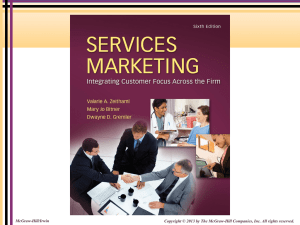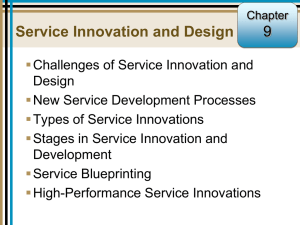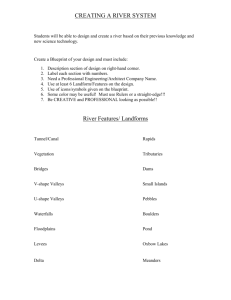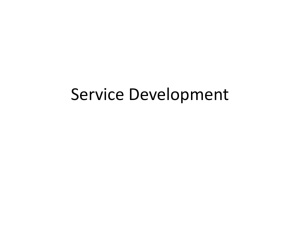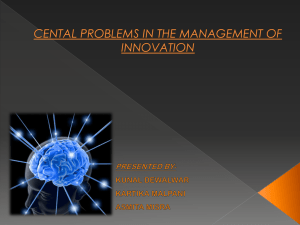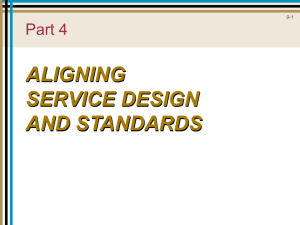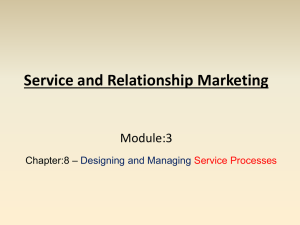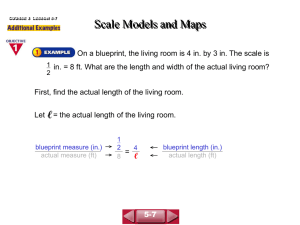Chapter 8
advertisement
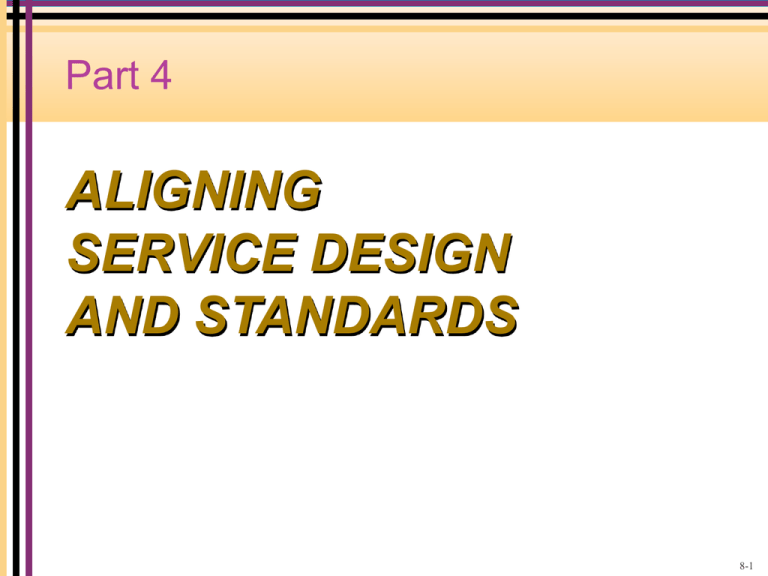
Part 4 ALIGNING SERVICE DESIGN AND STANDARDS 8-1 Provider Gap 2 CUSTOMER COMPANY Customer-driven service designs and standards Company perceptions of customer expectations Gap 2: The Service Design and Standards Gap 8-2 Key Factors Leading to Provider Gap 2 8-3 Chapter Service Innovation and Design 8 Challenges of Service Innovation and Design Important Considerations for Service Innovation Types of Service Innovations Stages in Service Innovation and Development Service Blueprinting: A Technique for Service Innovation and Design 8-4 Objectives for Chapter 8: Service Innovation and Design Describe the challenges inherent in service innovation and design. Present an array of different types of service innovations, including service offering innovation, innovating around customer roles, and innovation through service solutions. Discuss the importance of engaging customers and employees and employing service design thinking in service innovation. Present the stages and unique elements of the service innovation and development process. Demonstrate the value of service blueprinting and how to develop and read service blueprints. 8-5 Risks of Relying on Words Alone to Describe Services Oversimplification Incompleteness Subjectivity Biased Interpretation 8-6 Important Considerations for Service Innovation Involve customers and employees Employ service design thinking and techniques http://www.youtube.com/watch?v=s62DROeCU DU 8-7 Types of Service Offering Innovations Major or radical innovations FedEx overnight shipping Start-up businesses door-to-door airport shuttle New services for the currently served market Retailers offer play area or coffee bar 8-8 Types of Service Offering Innovations Service line extensions A restaurant adding new menu An airline offering a new route Service improvements The addition of wireless Internet connection to a hotel room Style changes Revising a logo, redesigning a website 8-9 Important Considerations for Service Innovation The five principles of service design thinking: User-centered: Services should be experienced and designed through the customers eyes Cocreative: All stakeholders should be included in the service design process Sequencing: A service should be visualized as a sequence of interrelated actions Evidencing: Intangible services should be visualized in terms of physical artifacts Holistic: The entre environment of a service should be considered 8-10 Service Innovation and Development Process 8-11 New Service Strategy Matrix for Identifying Growth Opportunities KFC in Africa PetSmart Tide Dry Cleaners 8-12 Example: PetSmart Example: Tide Dry Cleaners With video Service Concepts Examples Vedia_Finland Next Gen TV_US Smart Store _India Source: http://www.youtube.com/watch?v=zFbMZb1h9m4 http://www.youtube.com/watch?v=m5BPX4mEGG8 http://www.youtube.com/watch?v=m81yIvU3sfc Service Blueprinting A tool for simultaneously depicting the service process, the points of customer contact, and the evidence of service from the customer’s point of view. 8-16 Service Blueprint Components Physical Evidence Customer Actions line of interaction Visible Contact Employee Actions line of visibility Invisible Contact Employee Actions line of internal interaction Support Processes 8-17 Service Blueprint Components 8-18 Blueprint for Express Mail Delivery Service 8-19 Blueprint for Overnight Hotel Stay Service 8-20 Blueprint for DVD Rental Kiosk 8-21 Benefits of Service Blueprinting Provides a platform for innovation. Recognizes roles and interdependencies among functions, people, and organizations. Facilitates both strategic and tactical innovations. Transfers and stores innovation and service knowledge. Designs moments of truth from the customer’s point of view. Suggests critical points for measurement and feedback in the service process. Clarifies competitive positioning. Provides understanding of the ideal customer experience. 8-22 Building a Service Blueprint 8-23 Regarding Midterm Exam What I expect you to know The differences between good and services The Gap Model The service quality The strategies firms use to build relationship with customers The strategies firms use to recover from service failure
